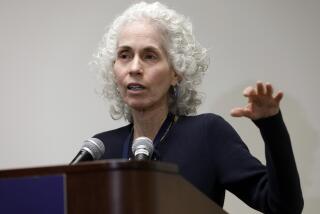Countywide : Indigent Patients Win Round in Court
- Share via
A judge handed a victory to ill and impoverished patients Thursday, ruling that county government must give them a chance to appeal when it refuses to pay their medical bills.
Three legal aid groups had sued the Board of Supervisors in October, alleging that poverty-stricken patients were being dunned after the county refused to reimburse doctors and hospitals for their treatment.
One of the patients, 64-year-old Pamela Arpin of Costa Mesa, was accepted into the Indigent Medical Services program after disabling back surgery. She was never told that the county program would not cover her $16,000 bill at Western Medical Center-Santa Ana and was stunned when a creditor began hounding her 18 months after the surgery, the suit alleged.
Superior Court Judge Eileen C. Moore ruled in Santa Ana that the county was denying patients due process and must grant them the right to an administrative appeal.
Legal aid attorneys hailed the ruling.
“This will give us a mechanism to make sure that people get fair treatment,” said attorney Harry Simon of the Senior Citizen Legal Advocacy Program in Santa Ana.
But Deputy County Counsel Thomas C. Agin said the decision may mean simply that the county spends more money conducting hearings and less money providing actual medical care for the poor.
“There isn’t much money to go around,” Agin said.
He added that county officials will have to decide “whether it is wiser to file an appeal or whether it is wiser to revamp the program.”
The Orange County Indigent Medical Services program was launched in 1983 to care for adult patients who were no longer eligible for state Medi-Cal insurance.
Like a health insurance policy, the program reimburses doctors, hospitals and clinics that provide medical treatment for the poor. Unlike most insurers, however, the county will reimburse providers only for “services that are medically necessary to protect life or to prevent significant disability or to prevent serious deterioration of health.”
In court documents, the county argued that it has contracts with health-care providers spelling out which medical services will be covered by Indigent Medical Services. It is the provider, not the county, that is responsible for determining what treatments are medically necessary and eligible for reimbursement, and the doctor or hospital can appeal if benefits are denied, the county has contended.
In practice, however, doctors and hospitals simply bill the patient for what the county won’t pay, the Legal Aid Society of Orange County argued.
Because the county refuses to reimburse local doctors and hospitals for “tens of thousands” of bills each year, they are becoming reluctant to treat the poor, Legal Aid alleges.
“A doctor who provides necessary medical care and then erroneously is not paid will be reluctant to treat indigent patients in the future and reluctant to continue treating that patient,” Legal Aid attorney Andrea Zigman said.
The county denied this, insisting in court papers that “there is absolutely no evidence . . . that any patient has been or will be denied treatment under the current structure which has existed for nearly eight years.”
“This is a program that has been operating in the dark for the last eight years,” seniors advocate Simon countered. “Now we’re going to shed a little light on it.”
More to Read
Sign up for Essential California
The most important California stories and recommendations in your inbox every morning.
You may occasionally receive promotional content from the Los Angeles Times.













